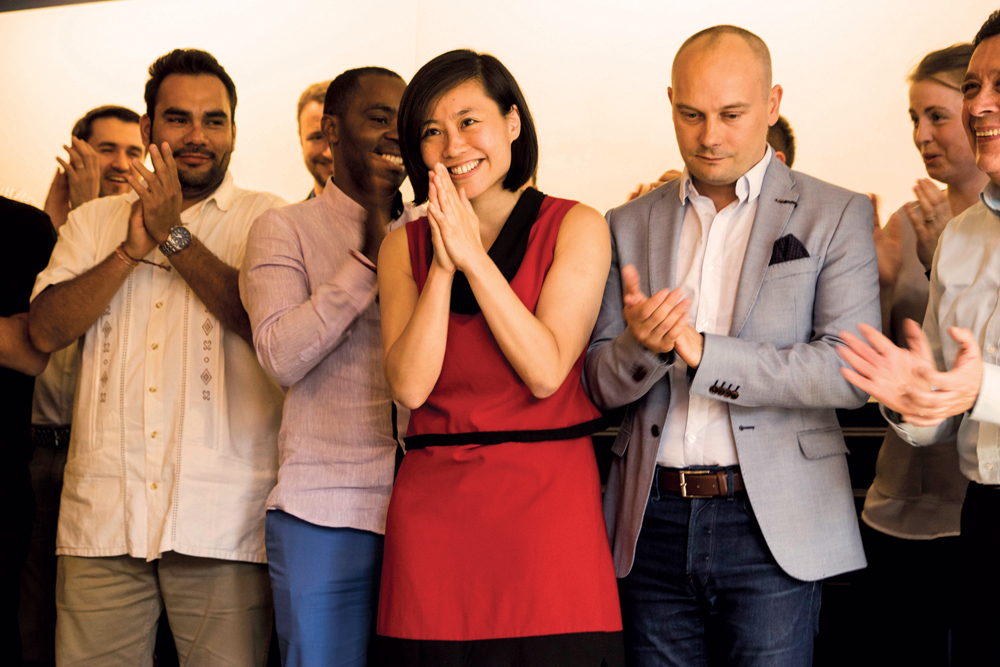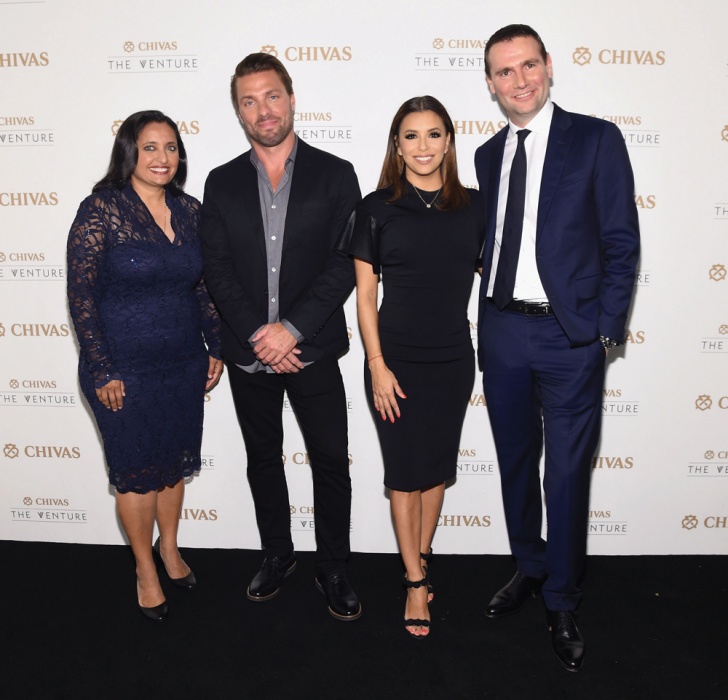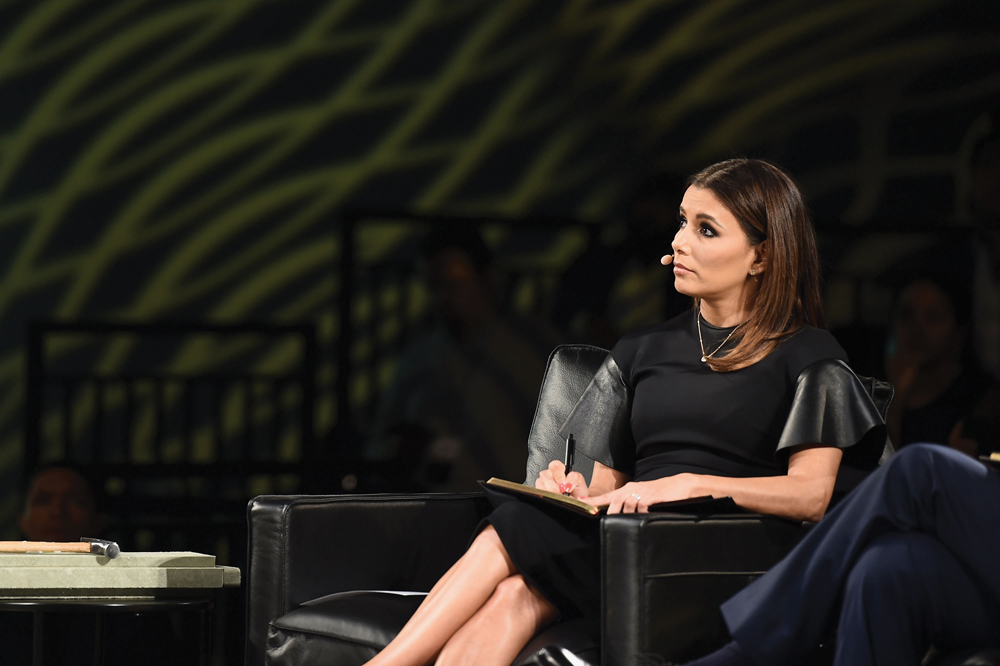Social Enterprise Jobdoh Benefits from Chivas Regal’s The Venture
03 Oct 2016 Winners and panellists in New York
Winners and panellists in New York
With the aim of using business as a force for good and to inspire change, 27 global start-ups competed for a share of Chivas The Venture’s US$1-million fund in July, the whisky brand’s philanthropic mission to discover and reward the world’s most promising social entrepreneurs. Now in its second year, The Venture received more than 2,500 applications from start-ups across six continents tackling a range of social and environmental issues with scalable and sustainable business solutions. A representative from each of the 27 participating countries then pitched The Venture’s prestigious judging panel hoping to win a share of the prize money to help fund and further their initiatives.
One of those social enterprises, and Hong Kong’s only representative, was Jobdoh and its co-founder Xania Wong. A former financier, Wong is a bubbly, spirited young entrepreneur. Her office at Cornwall House in Quarry Bay is a large open area, furnished with old aircraft parts, including a table made from an aeroplane wingtip and airliner seats used as lounge chairs. A number of companies share the space. “The ecosystem is good here,” Wong says. “There’s a lot of interesting start-ups here, so we bounce ideas off each other.”
 Xania Wong is announced as a finalist in Hong Kong
Xania Wong is announced as a finalist in Hong Kong
Jobdoh makes use of one of her main talents: connecting with people. Jobdoh matches people with jobs, the majority being ethnic minorities and single parents who need a helping hand. It does so by using its own computer algorithm, specially designed for the purpose. “Our clients range from office administrators to actors and actresses,” Wong says. The main strengths of the system are its ability to cope with flexibility and its speed. The fastest it has filled a post is less than 60 minutes from the job being advertised to an applicant being taken on.
In preparing for the competition’s final round, Wong and her fellow finalists travelled to England to take part in a transformational accelerator programme run by trainers and mentors at the University of Oxford’s Saïd Business School. She describes the experience as amazing. “We spent a week learning how to be better leaders, as we got some coaching sessions,” she says.
 The Venture’s judges were, from left, economist Sonal Shah, LSTN Sound founder Joe Huff, actress Eva Longoria, Pernod Ricard chief executive Alexandre Ricard
The Venture’s judges were, from left, economist Sonal Shah, LSTN Sound founder Joe Huff, actress Eva Longoria, Pernod Ricard chief executive Alexandre Ricard
To win financial backing in The Venture final, each social enterprise had just 13 seconds to persuade voters their projects were the most deserving. While Wong didn’t win, the experience helped sharpen her focus. “It made me want to do better, to do more,” she says of her efforts. “What I did learn is that we have to define and articulate more clearly our mission.”
Since the contest, Wong and her team have been finding ways to improve Jobdoh; by working together with Hong Kong non governmental organisations to gain a better understanding of the city’s ethnic minorities and single parents, and how to better cater to them. Wong’s ambtions stretch beyond Hong Kong. She hopes to enter labour markets in mainland China, Southeast Asia and the West.
The Venture Final’s US$300,000 top prize winner was Oscar Andres Mendez Gerardino’s Conceptos Plásticos, an enterprise that recycles plastic and rubber waste, turning it into building materials. It then works with NGOs and government bodies to supply materials for building shelters for the homeless, each of which takes a family of four just five days to construct. The materials can also be used to build classrooms, halls and other socially enabling infrastructure. Conceptos Plásticos combines the social, economic and environmental dimensions that make it worth a long-term investment, and The Venture’s capital, to fund growth and development.
 Longoria
Longoria
British social enterprise WeFarm, allowing farmers in remote areas without Internet access to exchange information about their business, won the US$200,000 second prize. Founder Kenny Ewan lets beneficiaries use a free phone text service to pass on useful farming knowledge and exchange advice. Ewan began working on the WeFarm project in 2009, cooperating with small communities of indigenous people around the world. More than 43,000 people now use the system.
Third place and US$100,000 went to EyeControl, an Israeli enterprise which assists patients with Lou Gehrig’s disease, also known as ALS, and other diseases that deprive them of full control of their limbs or speech. These debilitating conditions make it difficult to operate the touchscreens on everyday electronic devices.
 Comedian Trevor Noah hosted the final
Comedian Trevor Noah hosted the final
Co-founder Or Retzkin helped develop a simple, affordable portable electronic headset controlled by eye movements. Another co-founder, Shay Rishoni, a Lou Gehrig’s sufferer, was first to test the device.
A further US$100,000 was given to Wakami, founded by Maria Pacheco. Wakami buys fashion accessories made and designed by women in rural Guatemala and distributes them to retailers around the world. The enterprise teaches the women the skills they need, supplies the resources to start a business and offers management classes. Any income supports the women and their communities.
Finally, The Venture gave US$50,000 to Coolar, a social enterprise started by German inventor Julia Römer. Coolar supplies solar-powered portable refrigerators to store vaccines, medicines, food and other perishable goods where no mains electricity is available. The system is reliable, cost-efficient and sustainable.
The Venture, it would seem, is the ultimate win-win.
 The winners, from left, Oscar Andres Mendez, Julia Römer, Or Retzkin, Maria Pacheco, Kenny Ewan
The winners, from left, Oscar Andres Mendez, Julia Römer, Or Retzkin, Maria Pacheco, Kenny Ewan
Source: HashTagLegend